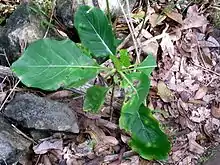Atractocarpus stipularis
Atractocarpus stipularis, commonly known as the green plum, is a flowering plant in the coffee family. The specific epithet alludes to its large stipules.[1]
| Green plum | |
|---|---|
 | |
| Scientific classification | |
| Kingdom: | Plantae |
| Clade: | Tracheophytes |
| Clade: | Angiosperms |
| Clade: | Eudicots |
| Clade: | Asterids |
| Order: | Gentianales |
| Family: | Rubiaceae |
| Genus: | Atractocarpus |
| Species: | A. stipularis |
| Binomial name | |
| Atractocarpus stipularis | |
| Synonyms | |
| |
Description
Atractocarpus stipularis is a small, rounded, sparsely branched tree growing to 3–12 m in height. The smooth, ovate leaves are 12–30 cm long and 8–24 cm wide. The axillary, cymose inflorescences bear fragrant white flowers; males with 20 or more, females with 2 or 3. The yellow-green fruits are 3.2–3.4 cm long. The flowering season is from early November to late February.[1]
Distribution and habitat
Atractocarpus stipularis is endemic to Australia’s subtropical Lord Howe Island in the Tasman Sea, 600 km east of the New South Wales mainland. It is widespread in sheltered sites at all elevations on the island.[1]
References
- "Atractocarpus stipularis". Flora of Australia Online: Data derived from Flora of Australia Volume 49 (1994). Australian Biological Resources Study (ABRS). Retrieved 2014-02-16.
This article is issued from Wikipedia. The text is licensed under Creative Commons - Attribution - Sharealike. Additional terms may apply for the media files.